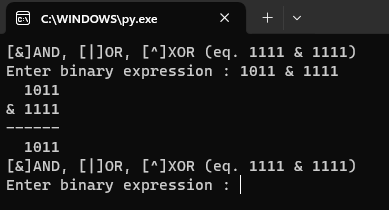Bitwise OR XOR AND Calculator
Example:

Code:
def valid_expression(expression: str) -> bool:
""" Returns True if string is valid binary expression. False otherwise.
- Operand is valid binary digits
- Operator is either '!', '&', or '|'
- Length of operands is more than 2 digits
- Both operands are same length
- Expression is in the format of “operand operator operand”, seperated by blanks"""
if len(expression.split()) == 3:
first, operator, second = expression.split()
else:
print("Format must be “operand operator operand”, separated by blanks")
return False
for i in range(len(first)):
if not first[i] in '10' or not second[i] in '10' : # If digit is not 1 or 0
print('Operand does not consist of binary digits')
return False
if not operator in '&^|':
print(f'{operator} is invalid. Must be !, & or ^')
return False
elif len(first) < 2 or len(second) < 2:
print('Length of the operands must be at least 2 digits')
return False
elif len(first) != len(second):
print('The operands are of different length')
return False
return True
def calc_binary_expression(firstBinary: str, operator: str, secondBinary: str) -> str:
""" Returns the result (str) of the binary expression. """
result = ""
for i in range(0, len(firstBinary)):
z = 0
if operator == "&":
z = 1 if int(firstBinary[i]) and int(secondBinary[i]) else 0
elif operator == "|":
z = 1 if int(firstBinary[i]) or int(secondBinary[i]) else 0
elif operator == "^":
z = 1 if int(firstBinary[i]) != int(secondBinary[i]) else 0
result = str(result) + str(z)
return result
def display_bin_calculation(firstBinary: str, operator: str, secondBinary: str) -> None:
""" Print the result of the binary and operator from parameter """
print(f"{'':<2}{firstBinary}")
print(f"{operator} {secondBinary}")
print("-"*(len(firstBinary)+2))
print(f"{'':<2}{calc_binary_expression(firstBinary, operator, secondBinary)}")
def main() -> None:
""" This program reads in a binary expression as a string and evaluates the result. """
while True:
userInput = input("[&]AND, [|]OR, [^]XOR (eq. 1111 & 1111) \nEnter binary expression : ")
# Without any input, break the loop
if len(userInput) == 0:
print("End of program.")
break
if valid_expression(userInput):
firstBinary, operator, secondBinary = userInput.split()
display_bin_calculation(firstBinary, operator, secondBinary)
if __name__ == "__main__":
main()


No Comments